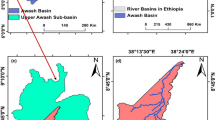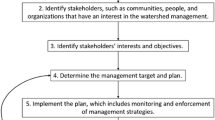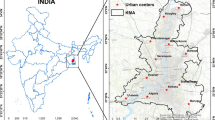Abstract
Watershed sustainability involves hydrologic, socioeconomic, environmental, and governance aspects, assessed by the Watershed Sustainability Index—WSI. However, in data-scarce basins, the application of the WSI can be biased, because of data incompleteness and uncertainty. This bias can be mitigated by the utilization of expert-based systems and user preferences. The objective of the present study was to assess basin sustainability of a data-scarce basin (Beheshtabad basin, in Iran) using the WSI, with weights calculated by automatic expert-based methods, and to compare the basin sustainability score with those of different basins of the world. Analytical Hierarchical and Network Processes (AHP and ANP) were used to obtain unbiased WSI weights, based on the results of questionnaires applied to 30 basin managers and specialists. Although the WSI weights calculated with the AHP and ANP methods varied from 0.19 to 0.33, and were significantly different from the WSI original weights (0.25), the overall WSI scores for the Beheshtabad basin using the modified and original WSI were similar (0.69 and0.70, respectively). The similar WSI scores resulted from the additive and balanced structure of the WSI index, compensating for the variation in the indicator weights. Compared to the WSI of 10 basins from developing countries around the world, the Beheshtabad watershed ranked third. The WSI bottlenecks affecting basin sustainability were related to water availability, which could be tackled by the establishment of appropriate water management policies.








Similar content being viewed by others
Data availability
The datasets generated during and/or analyzed during the current study are not publicly available because the permission to publish them is in the hands of responsible organizations, and researchers are not allowed to publish them, but are available from the corresponding author on reasonable request.
References
Alilou H, Rahmati O, Singh VP, Choubin B, Pradhan B, Keesstra S, Ghiasi SS, Sadeghi SH (2019) Evaluation of watershed health using Fuzzy-ANP approach considering geo-environmental and topo-hydrological criteria. J Environ Manage 232(November 2018):22–36. https://doi.org/10.1016/j.jenvman.2018.11.019
Catano N, Marchand M, Staley S and Wang Y (2009) Development and validation of the Watershed Sustainability Index (Wsi) for the Watershed of the Reventazón River. Comcure Report, 67. https://www.wpi.edu/Pubs/E-project/Available/E-project-121609-171302/unrestricted/UNESCO-COMCURE.pdf
Chandniha S, Kansal M, Anvesh G (2014) Watershed Sustainability Index assessment of a watershed in Chhattisgarh, India. Curr World Environ 9(2):403–411. https://doi.org/10.12944/cwe.9.2.22
Chaves HML, Alipaz S (2007) An integrated indicator based on basin hydrology, environment, life, and policy: The watershed sustainability index. Water Resour Manage 21(5):883–895. https://doi.org/10.1007/s11269-006-9107-2
Chen YC, Lien HP, Tzeng GH (2010) Measures and evaluation for environment watershed plans using a novel hybrid MCDM model. Expert Syst Appl 37(2):926–938. https://doi.org/10.1016/j.eswa.2009.04.068
Citation S (2011) Sustainability and the U.S. EPA. In: Sustainability and the U.S. EPA. https://doi.org/10.17226/13152
Cortés AE, Oyarzún R, Kretschmer N, Chaves H, Soto G, Soto M, Amézaga J, Oyarzún J, Rötting T, Señoret M, Maturana H (2012) Application of the Watershed Sustainability Index to the Elqui river basin, North-Central Chile. Obras y Proyectos 12:57–69. https://doi.org/10.4067/s0718-28132012000200005
de Castro CO, Loureiro ÓCS, Santos AV, Silva J, Rauen WB (2017) Water sustainability assessment for the region of curitiba. Int J Sustain Build Technol Urban Dev 8(2):184–194. https://doi.org/10.12972/susb.20170016
Firdaus R, Nakagoshi N, Idris A (2014) Sustainability assessment of humid tropical watershed: a case of Batang Merao Watershed, Indonesia. Procedia Environ Sci 20:722–731. https://doi.org/10.1016/j.proenv.2014.03.086
Görener A (2012) Comparing AHP and ANP: an application of strategic decisions making in a manufacturing company. Int J Bus Soc Sci 3(11):194–208. http://www.ijbssnet.com/journals/Vol_3_No_11_June_2012/22.pdf
Kansal ML and Gaur A (2011) Expert system based water sustainability index. In: World Environmental and Water Resources Congress 2011: Bearing Knowledge for Sustainability - Proceedings of the 2011 World Environmental and Water Resources Congress, 1692–1704. https://doi.org/10.1061/41173(414)176
Kroll CN, Song P (2013) Impact of multicollinearity on small sample hydrologic regression models. Water Resour Res 49:3756–3769. https://doi.org/10.1002/wrcr.20315
Lee YJ, Huang CM (2007) Sustainability index for Taipei. Environ Impact Assess Rev 27(6):505–521. https://doi.org/10.1016/j.eiar.2006.12.005
Maynard IFN, Cruz MAS, Gomes LJ (2017) Applying a sustainability index to the Japaratuba river wathershed in Sergipe state. Ambiente e Sociedade 20(2):201–220. https://doi.org/10.1590/1809-4422asoc0057r1v2022017
Ostrom E (2009) A general framework for analyzing sustainability of social-ecological systems. Science 325(5939):419–422. https://doi.org/10.1126/science.1172133
Razavi Toosi SL, Samani JMV (2012) Evaluating water transfer projects using analytic network process (ANP). Water Resour Manage 26(7):1999–2014. https://doi.org/10.1007/s11269-012-9995-2
Spangenberg JH and Bonniot O (1998) Sustainability indicators: acompass on the road towards sustainability, Wuppertal Papers, No. 81, Wuppertal Institut für Klima, Umwelt, Energie, Wuppertal, https://nbn-resolving.de/urn:nbn:de:bsz:wup4-opus-7218
Srdjevic B, Medeiros Y, Srdjevic Z and Schaer M (2002) Evaluating management strategies in paraguacu river basin by analytic hierarchy process. 1, 42–47. http://www.iemss.org/iemss2002/proceedings/pdf/volumeuno/132_srdjevic.pdf%5CnSrdjevic(2002).pdf
Srdjevic B, Medeiros YDP (2008) Fuzzy AHP assessment of water management plans. Water Resour Manage 22(7):877–894. https://doi.org/10.1007/s11269-007-9197-5
Tarigan APM, Rahmad D, Sembiring RA, Iskandar R (2018) An application of the AHP in water resources management: a case study on urban drainage rehabilitation in Medan City. IOP Conf Ser. https://doi.org/10.1088/1757-899X/309/1/012096
VanLe TM, DuongBUI D and Buurman J (2015) Development of a watershed sustainability index to assess water resources in the Nhue-Day river basin, Vietnam. October, 10
Wu Y, Wang Y, Chen K, Xu C, Li L (2017) Social sustainability assessment of small hydropower with hesitant PROMETHEE method. Sustain Cities Soc 35(August):522–537. https://doi.org/10.1016/j.scs.2017.08.034
Xi X, Poh KL (2014) A novel integrated decision support tool for sustainable water resources management in Singapore: synergies between system dynamics and analytic hierarchy process. Water Resour Manage 29(4):1329–1350. https://doi.org/10.1007/s11269-014-0876-8
Zhang H (2009) The analysis of the reasonable structure of water conservancy investment of capital construction in China by AHP method. Water Resour Manage 23(1):1–18. https://doi.org/10.1007/s11269-008-9261-9
Funding
This research was supported by Shahrekord University.
Author information
Authors and Affiliations
Corresponding author
Ethics declarations
Conflict of interest
The authors have no affiliation with any organization with a direct or indirect financial interest in the subject matter discussed in the manuscript.
Additional information
Publisher's Note
Springer Nature remains neutral with regard to jurisdictional claims in published maps and institutional affiliations.
Rights and permissions
Springer Nature or its licensor (e.g. a society or other partner) holds exclusive rights to this article under a publishing agreement with the author(s) or other rightsholder(s); author self-archiving of the accepted manuscript version of this article is solely governed by the terms of such publishing agreement and applicable law.
About this article
Cite this article
Zare Bidaki, R., Esmaeilzadeh, M. & Chaves, H.M.L. Assessing watershed sustainability with automatic expert-based methods and managers’ preferences. Sustain. Water Resour. Manag. 9, 70 (2023). https://doi.org/10.1007/s40899-023-00847-w
Received:
Accepted:
Published:
DOI: https://doi.org/10.1007/s40899-023-00847-w




